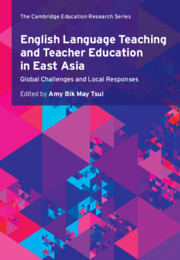Book contents
- English Language Teaching and Teacher Education in East Asia
- English Language Teaching and Teacher Education in East Asia
- Copyright page
- Contents
- Figures
- Tables
- Contributors
- Preface
- Acknowledgements
- 1 Glocalization and Grobalization: Critical Issues in English Language Teaching and Teacher Education in East Asia
- 2 Concepts of Globalization and English Language Teacher Education in Singapore
- 3 Learning to Teach English in Hong Kong: Transformation and Tensions Over Two Decades of English Language Teacher Education Policy
- 4 Meeting National Needs in English Language Teacher Education: Global Perspectives in Malaysian Initiatives
- 5 English Teacher Education in Postcolonial Philippines
- 6 China Going Global: Challenges and Responses in English As a Foreign Language Teaching and Teacher Education
- 7 English Education Reform, Teacher Education, and the Tokyo Olympics: Perfect Timing?
- 8 English Language Teacher Education in South Korea: Changes and Challenges
- 9 Preparing English Teachers in the Twenty-First Century: The Case of Taiwan
- 10 English Language Teacher Education in Thailand: A Mix of Global and Local
- 11 Interrogating Troubling Issues in Vietnam’s English Language Teacher Education
- Index
- References
3 - Learning to Teach English in Hong Kong: Transformation and Tensions Over Two Decades of English Language Teacher Education Policy
Published online by Cambridge University Press: 17 October 2020
- English Language Teaching and Teacher Education in East Asia
- English Language Teaching and Teacher Education in East Asia
- Copyright page
- Contents
- Figures
- Tables
- Contributors
- Preface
- Acknowledgements
- 1 Glocalization and Grobalization: Critical Issues in English Language Teaching and Teacher Education in East Asia
- 2 Concepts of Globalization and English Language Teacher Education in Singapore
- 3 Learning to Teach English in Hong Kong: Transformation and Tensions Over Two Decades of English Language Teacher Education Policy
- 4 Meeting National Needs in English Language Teacher Education: Global Perspectives in Malaysian Initiatives
- 5 English Teacher Education in Postcolonial Philippines
- 6 China Going Global: Challenges and Responses in English As a Foreign Language Teaching and Teacher Education
- 7 English Education Reform, Teacher Education, and the Tokyo Olympics: Perfect Timing?
- 8 English Language Teacher Education in South Korea: Changes and Challenges
- 9 Preparing English Teachers in the Twenty-First Century: The Case of Taiwan
- 10 English Language Teacher Education in Thailand: A Mix of Global and Local
- 11 Interrogating Troubling Issues in Vietnam’s English Language Teacher Education
- Index
- References
Summary
This chapter critically examines twenty years of English language teaching and teacher education reform in Hong Kong as well as the rationale behind these changes and what they mean for Hong Kong’s English language teachers. It throws a light on the role of English language in local teacher education policy, something which has fuelled controversy and debate. The chapter details the wide-ranging reforms that have been enacted by authorities in response to local and global issues in English language teaching including curriculum changes, assessment reform, language proficiency requirements, medium of instruction (MOI) policies across schools, recruitment of overseas language teachers and the provision of mandated continued professional development. Positioning Hong Kong as a complex and multilayered landscape where cultural, political, economic, linguistic and educational factors all intertwine, the chapter concludes that a form of government ‘mandate’ has characterised the implementation of education reforms since 1997.
Keywords
- Type
- Chapter
- Information
- English Language Teaching and Teacher Education in East AsiaGlobal Challenges and Local Responses, pp. 57 - 74Publisher: Cambridge University PressPrint publication year: 2020



